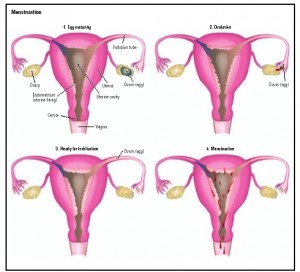Every woman goes through it at one time or another her first period. It may be exciting, it may be scary, it may be reassuring every woman feels a different way when it first happens. However you may be feeling, the start of menstruation is a real sign that you have moved from adolescence into womanhood. It may not seem like you’re any older, but your body is now physically prepared to have a baby of its own. This can be a scary thing, but by being knowledgeable and prepared, you can put any fears you have about menstruation and womanhood to rest.
What is Menarche?
 Your first menstrual period is referred to as menarche. You will probably notice it as a blood spot on your underpants when you go to the bathroom or change your clothes. This blood spot can look dark brown or bright red, so don’t be concerned if it isn’t the color you expected. You can use either a sanitary pad or tampon to catch the blood that comes out. From now on, you will receive a menstrual period according to a cycle that your body determines.
Your first menstrual period is referred to as menarche. You will probably notice it as a blood spot on your underpants when you go to the bathroom or change your clothes. This blood spot can look dark brown or bright red, so don’t be concerned if it isn’t the color you expected. You can use either a sanitary pad or tampon to catch the blood that comes out. From now on, you will receive a menstrual period according to a cycle that your body determines.
Each woman has her own individual cycle, usually lasting between 21 and 40 days. The beginning of each cycle is marked by your period. Usually lasting between 3 and 7 days, your menstrual blood will change color slightly throughout the duration of each period that you have. Your periods will probably start off light and then get heavier, eventually tapering off. It will probably take about 2 years for your period to become regular. You may miss a period here and there in the beginning, but don’t worry, this is a normal occurrence. And if you find yourself dealing with menstrual cramps, you may want to take a pain reliever or a natural supplement.
Age of Menarche
Menarche usually occurs about two years after your breasts develop (thelarche) and between 4 and 6 months after the growth of your pubic and underarm hair. The age of menarche in most North American women is around 12 or 13, though your first period can come anytime between 9 and 16, depending upon your height, weight, and cultural background. Early menarche is occurring more and more – girls as young as 8 have been known to get their periods. This is referred to as premature menarche. Girls who haven’t gotten their period by the age of 16 are described as experiencing primary amenorrhea. Sometimes external factors or complications may prevent your period from arriving when it should.
 Certain factors are thought to affect the age of menarche. Cultural and genetic factors play an important role in determining how fast your body will develop. Girls from different races all seem to develop at a slightly different rate. You may notice that some of your friends have already gotten their periods and you haven’t. You may even be wondering if something’s gone wrong with you. Rest assured, every girl develops at a different pace.
Certain factors are thought to affect the age of menarche. Cultural and genetic factors play an important role in determining how fast your body will develop. Girls from different races all seem to develop at a slightly different rate. You may notice that some of your friends have already gotten their periods and you haven’t. You may even be wondering if something’s gone wrong with you. Rest assured, every girl develops at a different pace.
If you haven’t gone through menarche by the time you are 15 or 16, though, you should make an appointment with your doctor to determine if there are any underlying problems. Many girls who are underweight or undernourished will not get their periods. It is generally thought that a certain weight (around 100 pounds) must be attained in order for your brain to send signals to your body to start menstruating.
Symptoms of Menarche
 You will probably feel some moderate symptoms when you first get your period. You may notice that you feel bloated or uncomfortable this is caused by water that your body retains during menstruation. Other signs of menarche include a slight headache, leg ache or backache for a few hours. The most common symptom of menarche, is cramping. You may feel abdominal cramping, similar to a stomachache for the first few days of your period. Try taking an over-the-counter pain medication, such as Advil or Tylenol, for the pain.
You will probably feel some moderate symptoms when you first get your period. You may notice that you feel bloated or uncomfortable this is caused by water that your body retains during menstruation. Other signs of menarche include a slight headache, leg ache or backache for a few hours. The most common symptom of menarche, is cramping. You may feel abdominal cramping, similar to a stomachache for the first few days of your period. Try taking an over-the-counter pain medication, such as Advil or Tylenol, for the pain.
You may notice some emotional changes too before your period. You may feel tense, angry, or sad because of the hormones your body is releasing. Don’t get too discouraged. These symptoms won’t last long.
Menarche Rituals
Every culture deals with menarche in different ways. Some cultures recognize menarche as an important time in a girl’s life and celebrate it in order to welcome the girl into the world of womanhood. Others view menarche as just an unimportant physical occurrence.
Historically, menarche has been celebrated with detailed menarche rituals. The Ancient Greeks mixed corn with menstrual blood to celebrate fertility. The Hopi Indians secluded their daughters during menarche, welcoming them back to the community 5 days later, as women.
Although many people today overlook menarche as an important stage in a young girl’s life, increasingly, more and more mothers are beginning to hold their own personalized menarche rituals, using music, jewelry, flowers, and dance to celebrate their daughter’s move into womanhood.
